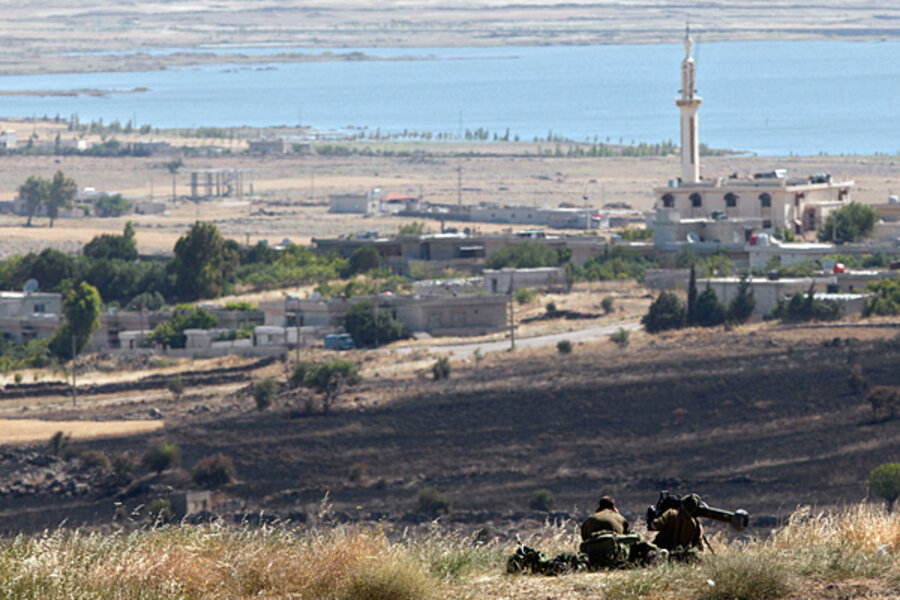In Israel, doctors quietly treat injured Syrians
Loading...
| Safed, Israel
Israel, which has never been reticent about publicizing its rescue missions when disaster strikes in far-flung corners of the globe, is being unusually discreet about its aid to victims of the fighting in neighboring Syria.
For the past four months, doctors in the Jewish state have been quietly offering medical treatment to a small number of Syrians, even as the government and army push to limit the scope of Israeli assistance.
So far, Israeli doctors have treated about 100 Syrians, according to local press reports. Of those, 33 have been here in Ziv Hospital, which receives patients referred from a new army medical facility at the Syrian border, according to hospital director Oscar Embon. The army declined to respond to a query on how many people have been treated at its facility.
"This is a very cruel war," Dr. Embon says. "It is, however, a source of satisfaction and pride that we can realize the values of our profession to cross borders, be humanistic, treat those in need, and help others."
Given the magnitude of the tragedy next door, however, and its impact on neighboring Jordan, Turkey, and Lebanon, some here believe Israel is not doing enough to assist injured Syrians or offer refuge to the country's massive refugee population.
Israeli Defense Minister Moshe Yaalon has ruled out establishing refugee camps for Syrians, while a spokesman for the army would not say whether Israeli troops have turned away Syrian refugees.
''The instances when we provided [medical] care do not represent a policy choice to constantly provide aid, they were decisions made out of humanitarian considerations,'' the spokesman wrote in an e-mail.
More than 100,000 people have died in the 2-1/2-year-old conflict in Syria. Israel's stated policy is that it is not involved in the fighting between President Bashar Assad's regime and opposition forces. Still, it has conducted several airstrikes in Syria believed to target weaponry bound for the Lebanese group Hezbollah, which is fighting alongside the Syrian Army. The Syrian regime accuses Israel of siding with the rebels.
When Syrian patients first started coming to Ziv, they tended to be ''rebels who were involved in the war,'' Embon says. ''But now it's simple citizens. There are shellings of innocent civilians and a share of them seek care in Israel.''
Among the recent arrivals at Ziv was a 15-year-old boy who had been severely wounded by shrapnel while working on a tractor. He was brought by an army ambulance with a blood-stained referral note in Arabic summarizing his treatment in Syria. The youngest Syrian patient the hospital's doctors have treated so far was a nine-year-old who had lost his eye to shrapnel, who came with his lightly wounded father.
Amram Hadary, head of the hospital's trauma unit, said that in many instances, the Syrian patients do not know exactly what caused their injuries. ''We always try to understand the mechanism of trauma, whether the explosion was in an open space or a closed space, whether the penetration was a bullet or fragment of shrapnel," he says. "A large share of them don't know exactly what harmed them. They say there was an explosion but they don't know what it was.''
Dr. Hadary says that his Israeli patients normally receive follow-up care in outpatient clinics and undergo a supervised rehabilitation process. In the case of the Syrians, however, they are sent back across the border without Israeli doctors having a clear picture of the medical options there.
''For one of the first Syrian wounded who was treated here, there was an issue of continuity of care,'' Hadary says. ''I asked him what follow-up he would have there. He told me his family is very poor and he doesn't know how he'll manage. We tried to keep him a few days longer so his well-being wouldn't be so dependent on others. But continuity of care is definitely a problem.''
A government official declined to respond when asked if patients were sent back rather than offered follow-up treatment out of concern Israel could become a magnet for refugees. But the official said that Israel's situation is different than that of Jordan, Turkey, and Lebanon – countries that have taken in hundreds of thousands of Syrian refugees each – ''because there is a formal state of war between Israel and Syria.''
Political analyst Yossi Alpher says Israel deliberately limits its humanitarian assistance so as not to give the Assad regime more ammunition to accuse it of taking sides in the war.
''The idea is to do the minimum that human morality demands from us as neighbors but not to be seen as the medical corps of the rebels.'' he says.
But Alon Liel, an academic who is the former director-general of the Foreign Ministry, says that minimum is not enough.
"Israel can do more," he says. "We should announce that refugees who feel endangered are welcome, and allocate space for them in the Golan Heights. Syrian patients should be given the option that if they need further treatment they can come again. This is the minimum Israel should do."





